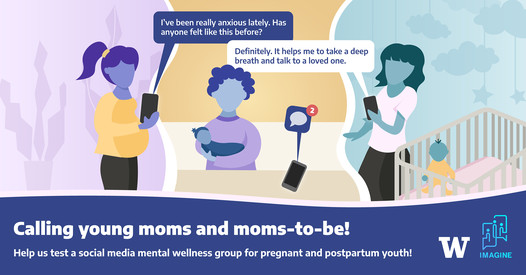August 16, 2021
Peripartum youth report pilot social media support group is acceptable and useful in supporting mental wellness

The IMAGINE study team recruited research participants through popular social media platforms, Facebook and Instagram.
The study team advertised the study between October 2020 and February 2021, through social media ads and word of mouth. 69 people contacted them to learn more about the study. From the 30 people they reached, 10 enrolled and participated.
The first IMAGINE group of 7 participants was active from December 2020 through March 2021, and the second group of 3 participants was active from February through May 2021. During the virtual group sessions, participants discussed the IMAGINE content and shared their perspectives on how the treatment activities, their thoughts, and contact with other people shape their moods and emotions.
Here’s what the team heard about participants’ experiences in the group:
- All participants said they would recommend IMAGINE to a friend.
- 89% of participants said that IMAGINE helped them learn new information and feel better emotionally.
- 67% of participants said their thoughts changed as a result of IMAGINE.
- 25% said their behavior changed as a result of IMAGINE.
Participants’ feedback to the team:
“[IMAGINE] helped me just understand that my emotions were normal… Before I felt like I was broken or I needed to be fixed or there’s something wrong with me. And now… there’s nothing wrong with me. [I’m] normal.”
“You get support from people your age and y’all got the same type of stuff going on, so it’s kind of like… you’re not alone.”
“Now I’m able to identify if I’m having a frustrating day. I use one of the strategies, and I’m able to calm myself down and actually realize what is going on… and help with my frustration.”
What’s next for IMAGINE?
The participants reported that IMAGINE was helpful to learn new skills and connect with other young parents. Following the completion of the pilot, the team plans to test IMAGINE in a larger study to understand in more detail whether the program improves participants’ mental wellness. Participants also shared some recommendations to improve the program, including facilitating more activities at the start of the group to build community connections, shortening some of the communication messages, and incorporating an initial in-person meeting for the group.
IMAGINE is led by researchers and clinical providers through the University of Washington, including Principal Investigator Dr. Keshet Ronen, Dr. Jennifer Unger, Dr. Amritha Bhat, Dr. Yolanda Evans, Anupa Gewali, Kristin Dachelet, Marimirca Jean-Baptiste, and former Department of Global Health graduate students, Alana Lopez and Elise Healy. The study was funded by the Technology and Adolescent Mental Wellness (TAM) program.